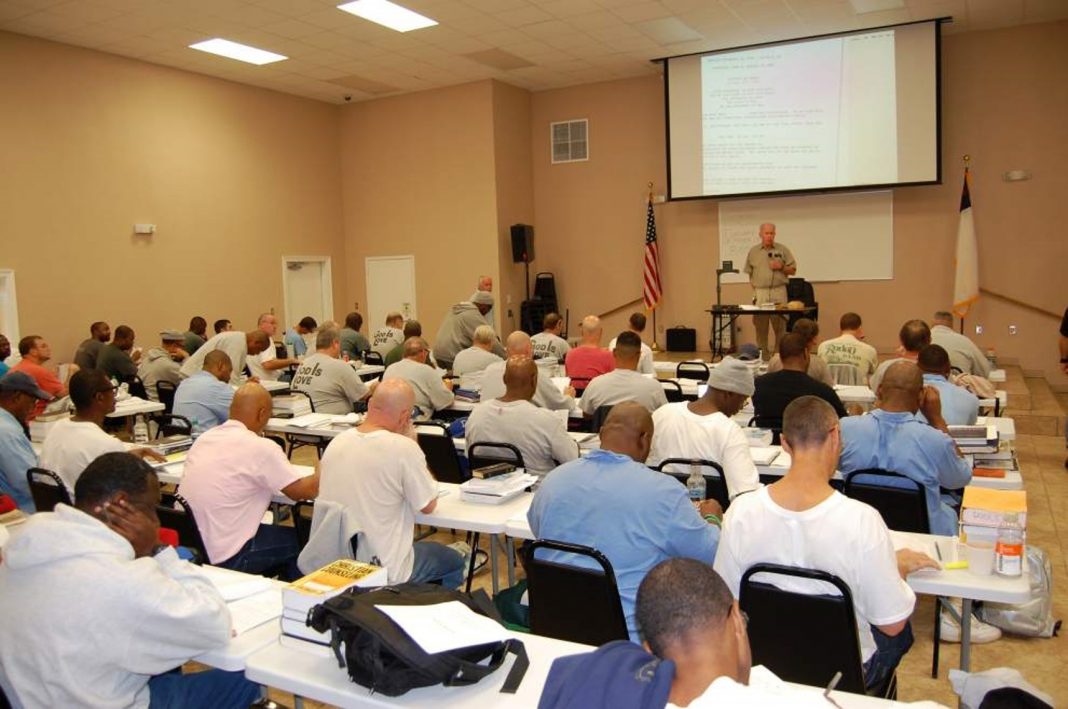Byron R. Johnson and Sung Joon Jang share key challenges affecting America’s prison system, the prison seminary movement and the positive impact that faith-based programmes can have
Early correctional practices in the US were more collaborative than those used in today’s prisons. They combined state resources with philanthropic, religious, and civic assets to manage better and foster offender rehabilitation. The overarching goal was rather basic – incentivise future good behaviours, not simply punish former bad ones.
More than 200 years later, it would be hard to overstate the challenges currently facing the American prison system – overcrowding, widespread mental illness, high levels of post-traumatic stress disorder, violence, only the most basic of programmes, high employee turnover, costly recidivism, and significantly higher mortality rates upon release from prison. Because of these challenges and shrinking resources, today’s prisons fail to ‘correct’ and often worsen things. And at great expense to taxpayers.
The role of faith in contemporary prison reform
The work of faith-based organisations and faith-motivated volunteers in prisons is often overlooked or mischaracterised. Regrettably, policymakers largely ignore decades of criminological research documenting how such programmes reduce social isolation and shame among prisoners and offer emotional and network pathways that support fresh starts. Consistent with this mounting body of empirical evidence, a new model of corrections is quietly taking hold in the United States – built in part on old ideals but also putting into place more unique practices developed in response to the painful experience of warehousing inmates. By necessity, these new approaches are being developed in some of America’s largest maximum-security prisons.
Corrections officials faced with rising populations and shrinking budgets are increasingly open to ‘faith-based’ providers offering services at no cost to help meet the needs of inmates. Prominent among these is something being referred to as the ‘prison seminary movement.’ In 1995, at the Louisiana State Penitentiary (infamously known as ‘Angola’), America’s largest maximum-security prison, Burl Cain, the new warden, approached the New Orleans Baptist Theological Seminary (NOBTS) about offering an accredited college degree at the prison. NOBTS would accept that offer and launch the programme later that year.
Angola’s unique prison seminary
A first-of-its-kind programme, Angola’s unique prison seminary trains and deploys graduates of NOBTS as inmate ministers in bi-vocational pastoral service roles throughout the prison (Hallett et al., 2017). They serve in lay-ministry capacities in hospice, cell block visitation, delivery of familial death notifications to fellow inmates, ‘sidewalk counselling’ and tier ministry, officiating inmate funerals, and delivering ‘care packages’ to indigent prisoners.
Inmate ministers enter service and leadership positions within Angola’s pre-existing network of inmate churches. Inmate ministers led most of Angola’s roughly two-dozen autonomous churches, but their ministry transcends these formal gatherings. Their unique status also grants them relative freedom of movement to minister among their peers daily. While legal doctrine has long rejected the notion that inmates have anything positive to contribute to the management of prisons, the Angola prison seminary movement and its unique inmate minister operation challenge this notion.
We found that participation in the seminary and inmate-led congregations helped prisoners change their behaviour and improve their lives. We also found that prisoners who are themselves the beneficiaries of inmate-led field ministry, in turn, help other prisoners make positive social changes (Jang et al., 2020). Research is helping us understand how faith may be linked with reconciliation, service to others, offender rehabilitation, identity transformation and re-offending reduction.
The impact of faith-based programmes
Correctional facilities face unprecedented challenges. Rampant violence, extremely high levels of recidivism, mounting taxpayer cost, and difficulty retaining employees typify recent headlines from the world of American corrections. And with the additional challenge of tightening correctional budgets, prisons lose precious vocational, educational, and treatment programmes. However, as we document through our on-site research, innovative approaches are being developed in desperately under-resourced maximum-security institutions. Both in the US and in other countries, a growing number of volunteer-based religious programmes are the dominant source of prisoner rehabilitation in custodial settings (Jang et al., 2018; Jang, Johnson et al., 2022a; Jang, Johnson et al., 2022b; Johnson et al., 2022).
Empirical evidence supports the notion that by embracing religious faith, inmates can and do transform their lives in meaningful ways, including the opportunity to choose a better self, the development of a new-found sense of their humanity, and a marked increase in their concern for others. In addition, faith-based programmes, such as prison seminaries, are helping us think more meaningfully about how to make prisons and our criminal justice system more restorative and less punitive.
References
- Hallett, M., Hays, J., Johnson, B. R., Jang, S. J., & Duwe, G. (2017). The Angola Prison Seminary: Effects of Faith- based Ministry on Identity Transformation, Desistance, and Rehabilitation. Routledge.
- Jang, S. J., Johnson, B. R., & Anderson, M. L. (2022a). Religion and Rehabilitation in Colombian Prisons: New Insights for Desistance. Advancing Corrections Journal, 14(Article 2), 29-43.
- Jang, S. J., Johnson, B. R., Hays, J., Hallett, M., & Duwe, G. (2020). Prisoners Helping Prisoners Change A Study of Inmate Field Ministers Within Texas Prisons. International Journal of Offender Therapy and Comparative Criminology, 64(5), 470-497. 10.1177/0306624X19872966
- Jang, S. J., Johnson, B. R., Anderson, M. L., & Booyens, K. (2022b). Religion and rehabilitation in Colombian and South African prisons: A human flourishing approach. International Criminal Justice Review, 10.1177/10575677221123249
- Jang, S. J., Johnson, B. R., Hays, J., Hallett, M., & Duwe, G. (2018). Religion and Misconduct in “Angola” Prison: Conversion, Congregational Participation, Religiosity, and Self-Identities. Justice Quarterly, 35(3), 412-442. 10.1080/07418825.2017.1309057
- Johnson, B. R., Hallett, M., & Jang, S. J. (2022). The restorative prison: Essays on inmate peer ministry and prosocial corrections. Routledge.

This work is licensed under Creative Commons Attribution-NonCommercial-NoDerivatives 4.0 International.


